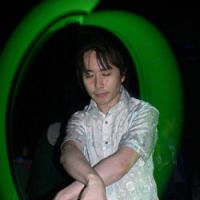Thinking it was high time I had my synapses chomped by digitally enhanced satanic hardcore dance music, I head off to the appropriately titled Hell's Gate event at Studio Cube 326 in Tamachi, a reclaimed armpit of Tokyo.
Hell's Gate is half Harajuku Goth-meet, half cyber-rave. By the time I enter the warehouse-like bunker that is Cube shortly after midnight, clutching only the event flyer for protection, there are already about 100 revelers dancing their bits off — flashing devil horns and glowsticks, sporting green dreadlocks and phlebotomy kits, etc. The crowd is a rare coming-together of male fake-haired blondies who'd look at home prowling the streets of Shibuya's Center-gai and Goth girls in Victorian nightgowns, fright wigs and faces so white they look like they've been dipped in a can of Dulux emulsion. Some of them energetically wave radioactive-looking glowsticks, creating neon patterns that cut through the perspiration and make some kind of Hell's Gate antihalo over the ravers' heads.
"It's a great stress reliever, I can tell you," says Hell's Gate DJ and my chaperon for the night, PlasmaDancer, eyeing the crowd approvingly and nodding his head to the don-don-don of the "hard dance" music being blasted through the club's oversize bass bins.
"It's all to do with the kick," he says, explaining the genre's particular appeal. "Other kinds of dance music are slower; hard dance, which is 150 beats-per-minute plus, is all about the kick drum," he adds. "It's a longer, more powerful sound that anchors the track."
PlasmaDancer ushers me from the club's entrance and into the heart of the throng, whereupon he starts dancing like the devil on Dexedrine. I follow him but soon get kicked in the ankle by a shaggy-haired Center Guy in pointy-toed boots.
This dance floor is dog eat dog.
Whimpering, I convince DJ PlasmaDancer — a 27-year-old Welshman who now calls Tokyo home — to pull up a pew at the bar and give me a brief history of the global hardcore-dance-music scene. From what I could make out over the barrage of bpms, it goes a bit like this: Around the turn of the millennium, a bunch of Finnish producers got bored with the then-popular happy-hardcore sound — itself a byproduct of the early '90s U.K. rave scene — and decided to strip happy hardcore of its cheesy housey piano plinks, replacing them with altogether darker melodies and in the process create their own hardcore subgenre. One or two of these producers even made it to Tokyo, inspiring a handful of acolytes to start their own scene here.
One such acolyte is Hell's Gate founder Zio. When I meet him shortly before he's due to start the second of his two DJ sets, he's got a white contact lens in his left eye that makes him look like an extra in a Siouxie & the Banshees video. Zio, I discover, is a 28-year-old Niigata native who moved to Tokyo after high school to study hairdressing. When he's not promoting or DJing at his own events, or making his own music, he sells cell phones for a living. He probably takes his contact lens out for that.
Either way, he must be good at his job. "I spend about ¥45,000 a month on tunes," he says. It turns out he buys about a dozen 12-inch records and between 20 and 30 downloads per month. The downloads he then whacks onto a CDR to play out for his DJ sets.
When he first arrived in Tokyo and started going clubbing in the early Noughties, Zio listened to techno and rave music — "the kind of stuff that was popular at (club) Juliana Tokyo," he says. Then he had his musical epiphany: He downloaded an MP3 mix by Alek Szahala, one of those early Finnish hardcore producers. And he hasn't looked back since.
Although the hard dance audience is currently small, Zio wants to take Hell's Gate to a bigger venue and, eventually, go international.
"At the moment, in terms of dance music, psychedelic trance and progressive house are the most popular genres in Tokyo. I want to get hard dance to the same kind of level. I'd love to do a hard dance event at ageHa," he says, referring to the cavernous, 3,000-capacity club in Tokyo's Koto Ward where superstar DJs such as Paul Van Dyk have spun.
However, he's aware that the still-nascent scene here is lacking a superstar it can call its own.
"Abroad, if people are into something I think it's because they really love the music," explains Zio. "Whereas in Japan, if there are no personalities, if it's not trendy, it doesn't become popular. Something that's underground stays underground."
That's perhaps why Zio has invited the closest the scene has got to a superstar — Melbourne's DJ Hellraiser — to play at Hell's Gate's first anniversary party next month. Zio reckons he'll get 400 people through the door.
In the meantime, Zio makes his excuses and slinks off to the dance floor, where a dandy DJ is behind a laptop wearing white gloves and a surgical mask and pulling Christ-like poses beside a female assistant.
Me, I stay where I am. My ankle is beginning to throb.
Hell's Gate's first anniversary event will be at Studio Cube 326, 3-2-6 Kaigan, Minato Ward, Tokyo on Nov. 29 from 11 p.m. till late (advance tickets ¥2,500; ¥4,000 at the door). For more information, visit www.studiocube326.com. DJ PlasmaDancer can be found at his blog thankyouforthehorse.com/




